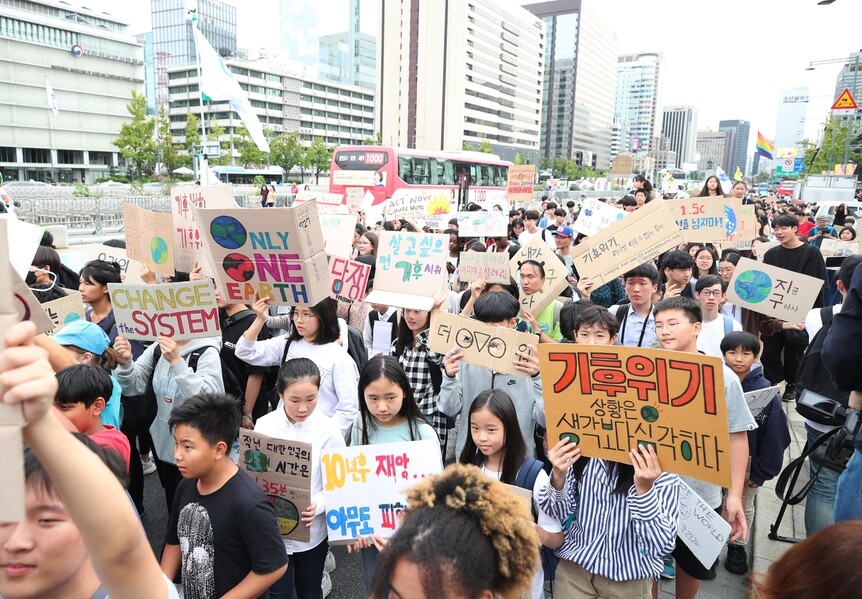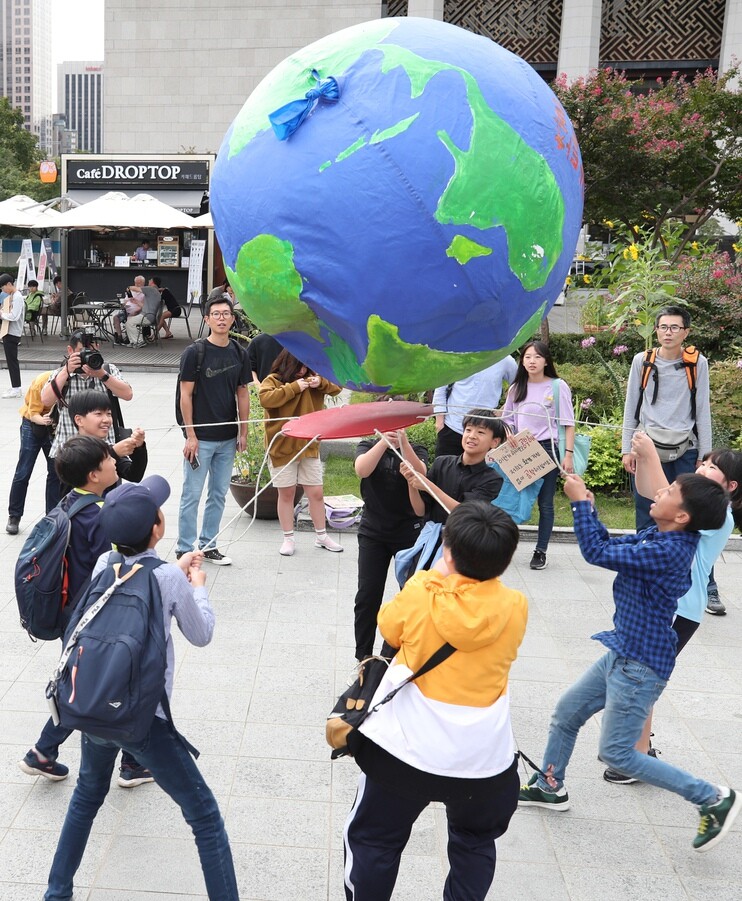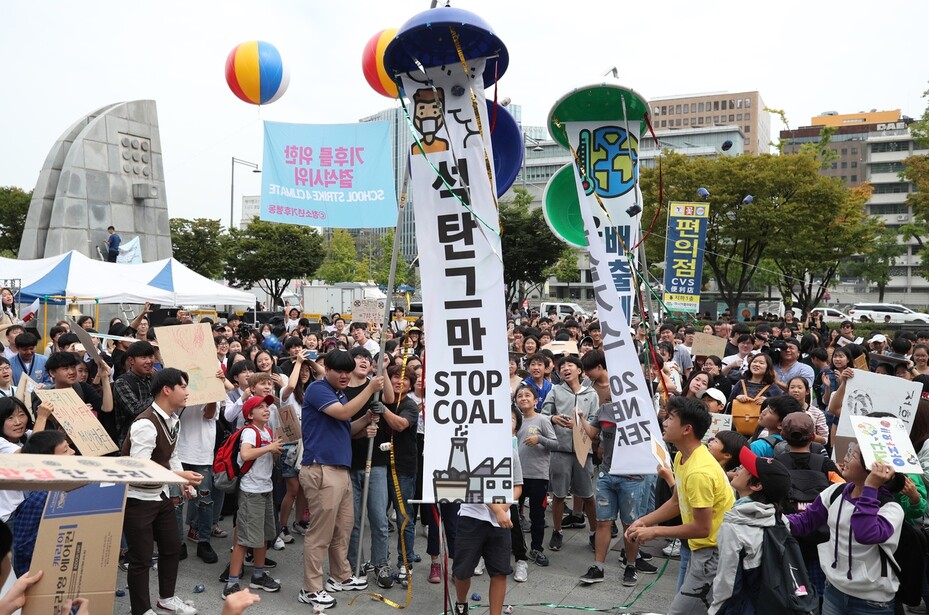hankyoreh
Links to other country sites 다른 나라 사이트 링크
S. Korean students hold 3rd “school strike” to call on Blue House to take action on climate change

“Right now, the government and corporations aren’t doing a thing about the environment. But if we come together like this and raise our voices, don’t you think they’ll take action?” said Park Bo-mi, 15.
Park had cut out of school early to attend a “school strike” demonstration with her father. Though she’d heard that skipping classes might have a negative impact on her participation grade, she figured that the school strike was more important than attendance. “My home room teacher has my back. This morning they told me they support me and told me to have a good time,” Park recalled.

Lee Seung-min, 18, attended the school strike with 34 other students from his school. On a poster recycled from a box, Lee had written a four-line poem about climate action: “Done with waiting / let’s take action / and get involved / with no regrets.”
“If we screw up the environment, it won’t be easy to reverse it. I think we need to make the most of this opportunity. The school said it wouldn’t excuse our absence, but that didn’t stop me and my 34 friends from coming to the protest,” Lee said.
On Friday, 18 people, some skipping school and others taking time off of work, took the stage to speak during a comment session open to “our entire generation.” “Even though I have my midterm exams the day after tomorrow, I came out here today because of how severe climate change has gotten,” said Han Da-sol, 16, one of the speakers.
Han moved to rural Inje County in Gangwon Province when she was younger because of sensitive skin and asthma. “Because the winters have been unseasonably warm, the Inje Icefish Festival has been cancelled or delayed several times,” Han said. She called on the government and large corporations to take interest and action “so we can focus on our studies again without worrying about our water, air, and forests being destroyed.”
On Friday, Teenage Climate Action, which organized the school strike, announced the “grade” that teenagers were giving the South Korean government for action on the climate crisis and awarded the government the “most irresponsible” prize.
“The current government has only said it will reduce its carbon emissions by 2030 without getting into the details,” said Kim Yu-jin, an activist with the group, by way of explaining why it got a grade of zero for its action on the climate crisis.
“The government’s actions fully deserve the title of ‘most irresponsible.’ Its irresponsible climate policy is forcing teenagers who ought to be at school to join street demonstrations,” Kim added.
This was the third climate strike to be organized by the group, following previous events on Mar. 15 and May 24. The strike was first conceived by Greta Thunberg, 16, the Swedish climate activist. In August 2018, Thunberg started protesting in front of the Swedish parliament instead of going to school, calling for the government to take action on climate change. Her school strike ended up lasting over a month.

Teens from around the world took notice of Thunberg’s solo protest, giving rise to the “Fridays for Future” movement. Eventually, 1.6 million teenagers from some 130 countries, including Germany, the UK, France, Australia, and Japan, were calling for action on climate change every Friday. On Sept. 16, Thunberg and her Fridays for Future campaign were awarded Amnesty International’s Ambassador of Conscience Award. This year, Thunberg also became the youngest person to be nominated for the Nobel Peace Prize.
After Friday’s demonstration at Seoul’s Gwanghwamun Square, the 500 demonstrators, both teenagers and adults, marched to the front of the Blue House. After reaching the Blue House, the demonstrators presented the report card, a certificate detailing its “prize,” and a letter containing demands. Among five total demands, the group wants the government to scrap new coal power plants that are supposed to be built by 2020, make a public declaration about the climate crisis, and hold an official meeting with Teenage Climate Action.
By Kim Hae-yoon, staff reporter
Please direct comments or questions to [english@hani.co.kr]

Editorial・opinion
![[Column] Season 2 of special prosecutor probe may be coming to Korea soon [Column] Season 2 of special prosecutor probe may be coming to Korea soon](https://flexible.img.hani.co.kr/flexible/normal/500/300/imgdb/original/2024/0426/3317141030699447.jpg) [Column] Season 2 of special prosecutor probe may be coming to Korea soon
[Column] Season 2 of special prosecutor probe may be coming to Korea soon![[Column] Park Geun-hye déjà vu in Yoon Suk-yeol [Column] Park Geun-hye déjà vu in Yoon Suk-yeol](https://flexible.img.hani.co.kr/flexible/normal/500/300/imgdb/original/2024/0424/651713945113788.jpg) [Column] Park Geun-hye déjà vu in Yoon Suk-yeol
[Column] Park Geun-hye déjà vu in Yoon Suk-yeol- [Editorial] New weight of N. Korea’s nuclear threats makes dialogue all the more urgent
- [Guest essay] The real reason Korea’s new right wants to dub Rhee a founding father
- [Column] ‘Choson’: Is it time we start referring to N. Korea in its own terms?
- [Editorial] Japan’s rewriting of history with Korea has gone too far
- [Column] The president’s questionable capacity for dialogue
- [Column] Are chaebol firms just pizza pies for families to divvy up as they please?
- [Column] Has Korea, too, crossed the Rubicon on China?
- [Correspondent’s column] In Japan’s alliance with US, echoes of its past alliances with UK
Most viewed articles
- 1Is Japan about to snatch control of Line messenger from Korea’s Naver?
- 2[News analysis] Using lure of fame, K-entertainment agency bigwigs sexually prey on young trainees
- 3[Column] Park Geun-hye déjà vu in Yoon Suk-yeol
- 4Will NewJeans end up collateral damage in internal feud at K-pop juggernaut Hybe?
- 5‘We must say no’: Seoul defense chief on Korean, USFK involvement in hypothetical Taiwan crisis
- 6[Column] The clock is ticking for Korea’s first lady
- 7[Column] Season 2 of special prosecutor probe may be coming to Korea soon
- 8Korea’s 1.3% growth in Q1 signals ‘textbook’ return to growth, says government
- 9Division commander ordered troops to enter raging flood waters before Marine died, survivor says
- 10Report reveals toxic pollution at numerous USFK bases